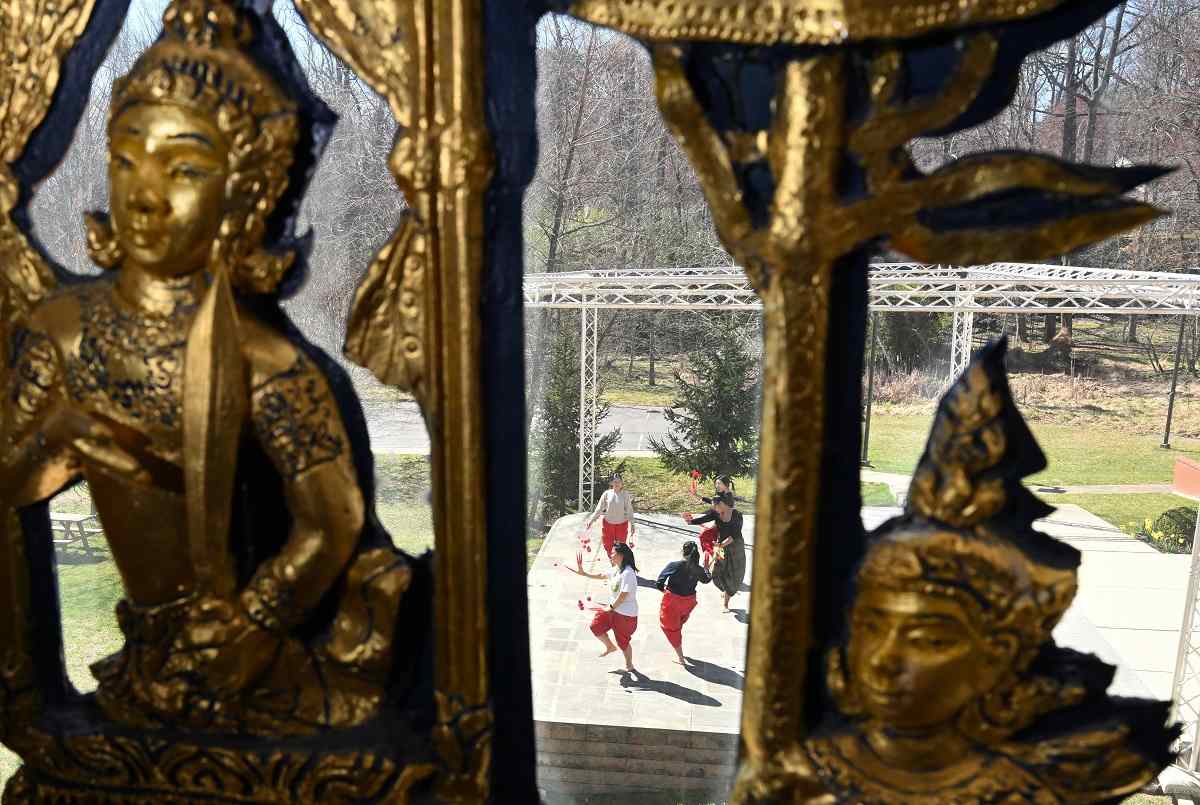
The dancers practice outside the temple, where the Thai new year festival will be held on April 16.
16:53 JST, April 3, 2023
At her Thai Buddhist temple in Silver Spring, Maytinee Pramawat went to a closet filled with gilded headdresses and performance supplies and found what she needed: thin decorative red cones topped with pompoms. As her students filed into practice, they changed into loosefitting red pants, capped their fingers with the cones, then went through a dance they plan to perform at the temple’s biggest festival since the pandemic began.
Under her direction, they pinched pointer and thumb together, fanning out the rest of their fingers – forming the “jeeb” hand gesture, a key element of traditional Thai dance – then gracefully extended their arms and released the pinch in a fluid motion accentuated by the pompoms.
These women, like a growing number of Americans, come from an array of ethnic backgrounds: African American, Native American, Vietnamese and Lao.
But the thread that binds them is Thai. Each has at least one Thai parent and spent most weekends of their childhoods at Wat Thai Washington, D.C. – the region’s largest Thai temple, in Silver Spring – learning the language, sharing spicy meals and bonding through traditional music and dance.
Pramawat, whose mother is African American and whose father is Thai, was 3 when her father – also a traditional Thai dancer and a Muay Thai fighter – began taking her to the temple to learn the language and performance arts.
“Thai dancing … was a sense of identity, pride, fun, hanging out with your friends,” said Pramawat, 44, a Silver Spring resident who works in human resources. “As I got older, it meant giving back and really supporting the community.”
After college, she assisted her dance teacher, and later, she became the temple’s dance teacher. For the upcoming performance, she chose for her students a dance from Isaan, the northeastern region of Thailand.
They’ve got a few weeks to nail the routine. Then on April 16, they’ll perform at the temple’s Thai new year festival, a party open to all, with food, dance and music to celebrate Songkran, the biggest Thai holiday of the year.
In Thailand, Songkran, also known as the water festival, is celebrated nationwide as a fun week-long water fight. The holiday falls in April, the hottest month of the year, just before the arrival of the monsoon rains. The dance Pramawat selected for her students is meant to invoke the rains.
“Being blessed by rain – hopefully not during the show – is always a sign of good luck,” said Pramawat, who will also perform for Songkran with another dance group. “This dance has upbeat, lively music. So I thought, what a way to rock it out by using this dance.”
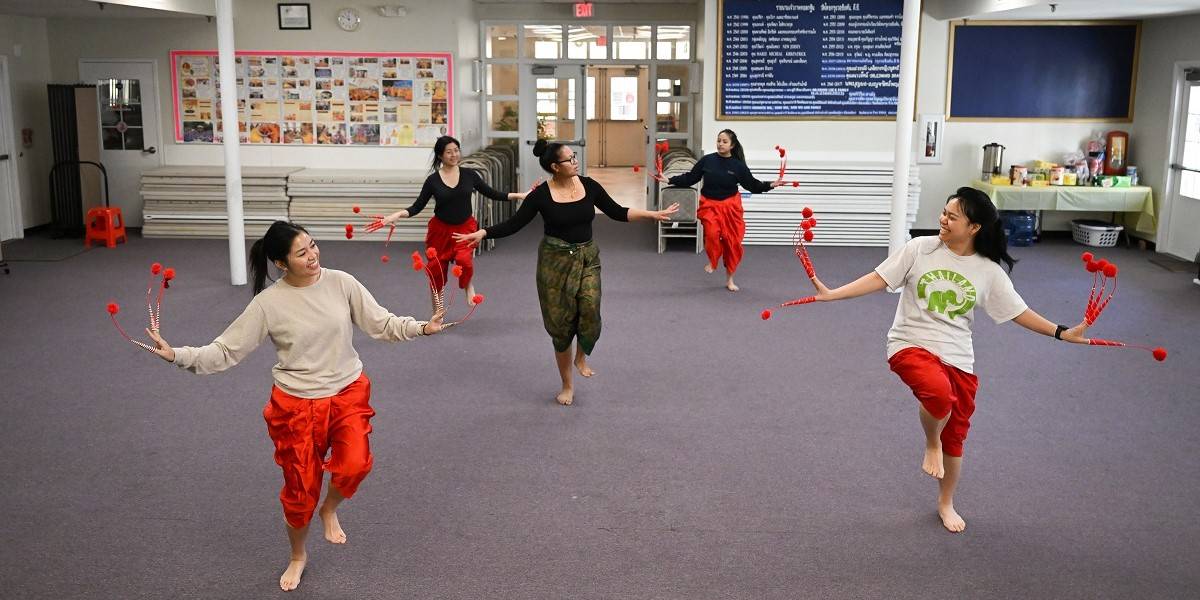
Maytinee Pramawat, center in black pants, goes through a dance routine with her students, from left, Gabby Noiwan, Antiena Nguyen, Pailin Phongroop and Phanna Iamlek.
Preserving Thai culture
Across the United States, temples serve as Thai American community centers, where adults born in Thailand bring their children – either born in America or simply Americanized – to keep their language and traditions alive.
Wat Thai D.C. began in 1974 when two monks moved into a house on Wayne Avenue in Silver Spring, and since 1986 has been in its current location, 13440 Layhill Road, said Phramaha Ruangrit Thaithae, 52, one of nine monks living at the temple. It is the oldest and largest Thai temple in the D.C., Maryland and Virginia region, with 2,500 congregants, Thaithae said. There are approximately 12,000 Thais in the region, according to the 2015 census numbers.
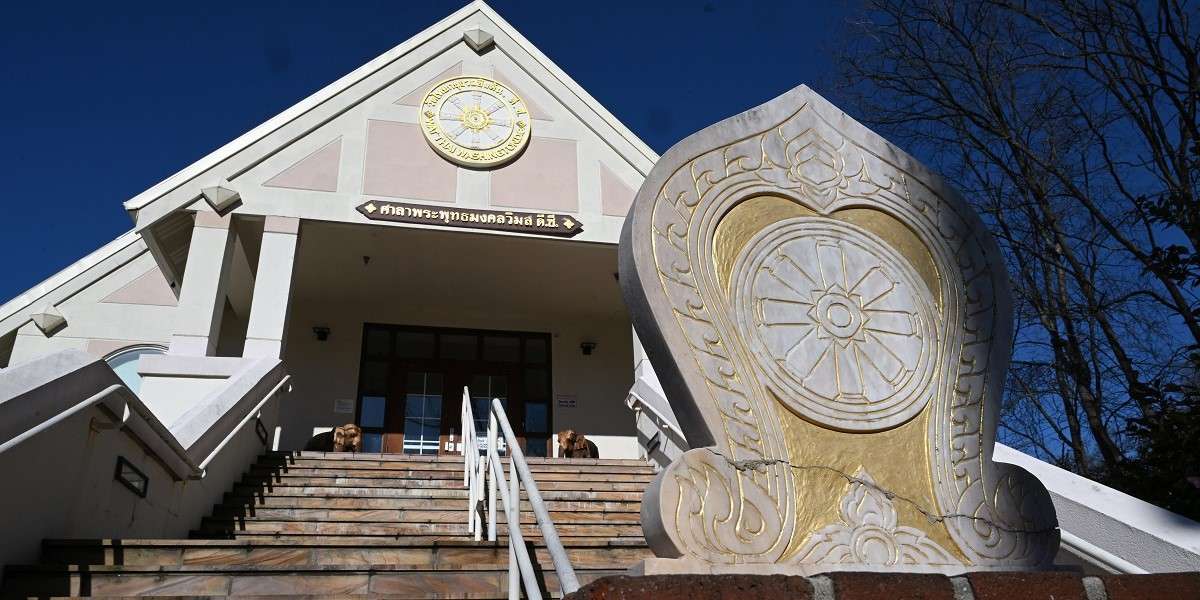
Wat Thai Washington, D.C., is located at 13440 Layhill Road in Silver Spring.
For Phanna Iamlek, Wat Thai D.C. gave her a first taste of formal education. Her parents, who were farmers in Thailand, left her with family when they immigrated to work at a relative’s Thai restaurant in Wheaton. When she was brought to join them at age 5, the temple helped keep her rooted.
“It kept me connected at a time when I moved to a whole new country that spoke a totally different language,” said Iamlek, now 28, a physical therapist working with MedStar and living in Silver Spring.
Antiena Nguyen – born to a Vietnamese father and Thai mother – has been going to the temple since she was 4.
“It started off with my mom wanting to find a way for me to preserve my Thai culture,” said Nguyen, a 27-year-old Rockville resident who designs custom closets. “As I grew older … you get to that rebellious age. You don’t want to do it anymore. But my mom was in that generation of parents that was like, ‘No, you’re going to go to the temple, and you’re going to learn this.'”
In high school, Nguyen came to value her temple education, and after college, she returned to help teach.
The came covid. In March 2020, just before Songkran, “the temple shut down for the sake of the well-being of the monks living there: no visitors were allowed, and all the typical activities ceased,” said Thaithae, who has lived at the temple since 1998.
For some congregants, the closure created a sudden void.
“I had this routine of going to the temple every weekend, and I kind of feel like how everyone else felt – somewhat disconnected,” Pramawat said. “A place that used to be so lively and open no was completely shut down.”
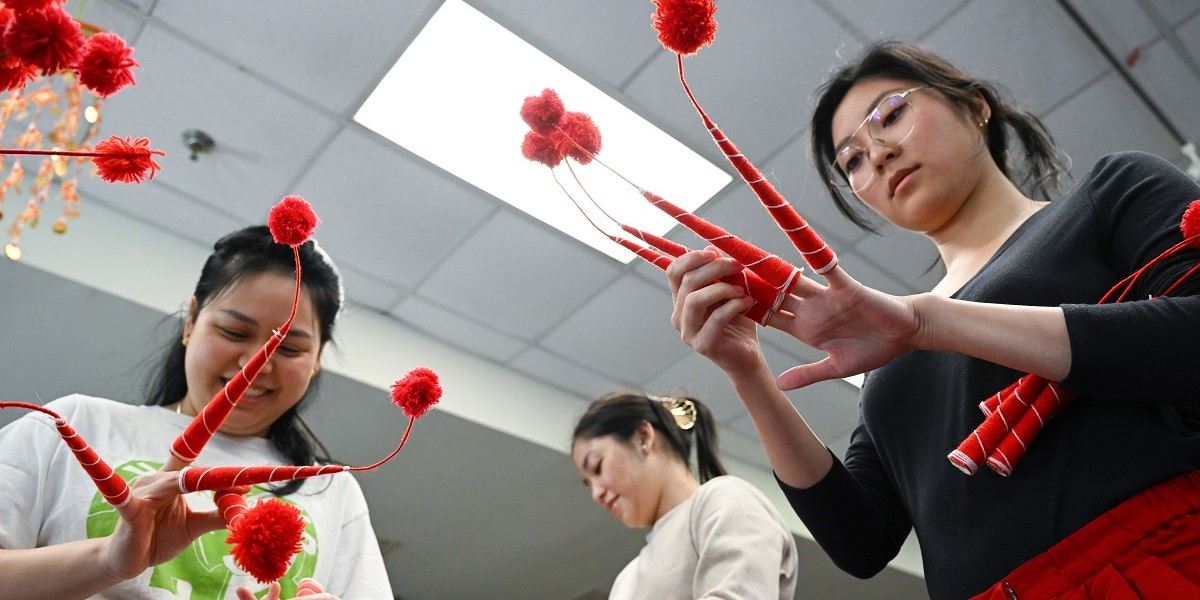
From left, Phanna Iamlek, Gabby Noiwan and Antiena Nguyen put on decorative finger coverings at a rehearsal for the upcoming Songkran festival at Wat Thai Washington, D.C., which is located in Silver Spring.
A lost generation at Wat Thai
The temple has gradually reopened and now hosts Sunday sermons as well as modest celebrations for Buddhist holy days, Thaithae said. Some people have returned for the daily preparation of meals for the monks, but attendance has yet to reach pre-covid levels.
And with language and culture classes yet to resume, some worry that a generation of children have zero ties to the temple.
Nguyen once felt it was time “to go off, be an adult” and pass the baton to the age group below her. But the pandemic changed everything.
“There’s a huge gap of kids that should have been performing, honing their craft, really being the new heads and leaders of the performance group in the temple,” she said, concerned that those who left for college won’t come back. “It’s almost like a lost generation of kids … So now the temple is relying on us older generations to come and perform.”
Ganokrut Mookkung, a 21-year-old at University of Maryland who started going to the temple when she was about 3, calls herself the “baby” of her dancing group and sees herself as a role model for the younger generation: “How can I at least try to influence them, keep some part of their culture thriving and going into the future?”
Mookkung, who is of Thai, Lao and Native American descent, spent the pandemic stuck in her bedroom, watching YouTube for Thai news that she used to pick up at the temple.
“I miss being around aunties yelling in the kitchen. I miss my friends and I talking about what’s happening in Thailand,” she said, nearly bursting with excitement about the return of the festival. “When I found out that Songkran was happening, I was like yes! Our time to connect with our community, connect with ourselves.”
Normally Pramawat would teach children to dance for Songkran, but with no classes, she is relying on these older students with years of experience. She sees the festival as a “coming out party” to invite people back to the temple, which, Thaithae said, plans to relaunch summer school for kids in June.
Wat Thai D.C.’s Songkran festival used to draw about 3,000 attendees, Thaithae said. After a three-year pause, he and the dancers hope for a big party but have modest expectations.
“Songkran used to be this huge thing. It was crowded, parking was a mess, people would come from all over the D.C. area,” Iamlek said. “It was chaotic, but in the best way: Everywhere you looked, it was monks walking around talking to people … people of all different ages and cultures coming and seeing all of it – it’s like a piece of Thailand, and you’re not in Thailand.”
If you go, here are details: The Songkran festival of Wat Thai Washington, D.C. will be Sunday, April 16, 9 a.m.-4 p.m., at 13440 Layhill Road, Silver Spring, Md.
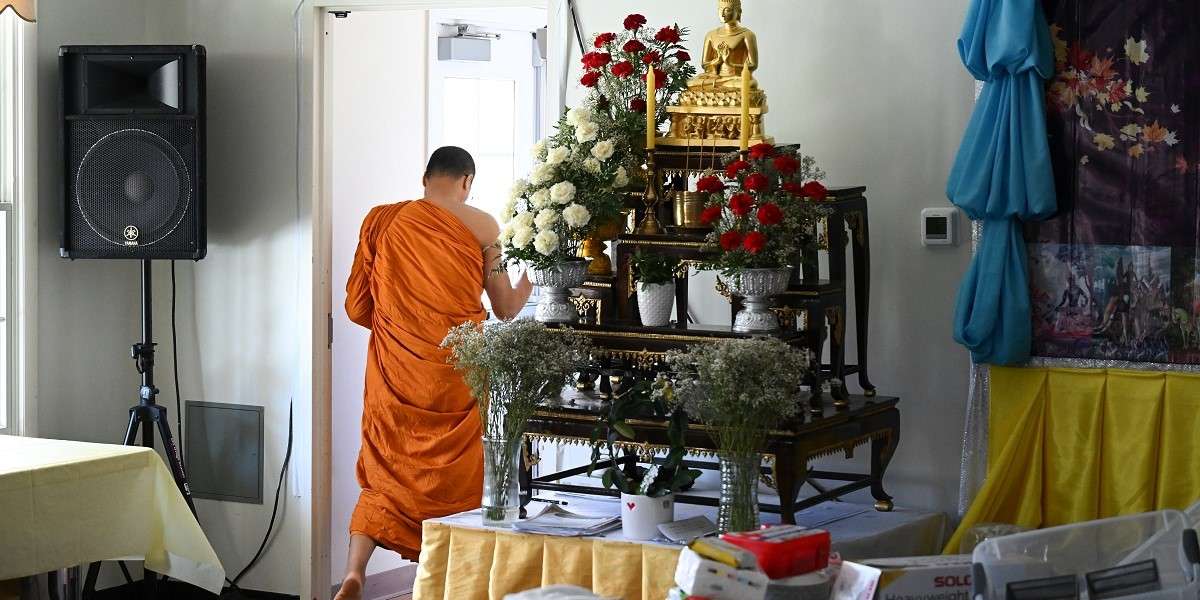
A monk at Wat Thai D.C.
Top Articles in News Services
-

Survey Shows False Election Info Perceived as True
-

Hong Kong Ex-Publisher Jimmy Lai’s Sentence Raises International Outcry as China Defends It
-

Japan’s Nikkei Stock Average Touches 58,000 as Yen, Jgbs Rally on Election Fallout (UPDATE 1)
-

Japan’s Nikkei Stock Average Falls as US-Iran Tensions Unsettle Investors (UPDATE 1)
-

Trump Names Former Federal Reserve Governor Warsh as the Next Fed Chair, Replacing Powell
JN ACCESS RANKING
-

Producer Behind Pop Group XG Arrested for Cocaine Possession
-

Japan PM Takaichi’s Cabinet Resigns en Masse
-

Japan Institute to Use Domestic Commercial Optical Lattice Clock to Set Japan Standard Time
-

Man Infected with Measles Reportedly Dined at Restaurant in Tokyo Station
-

Israeli Ambassador to Japan Speaks about Japan’s Role in the Reconstruction of Gaza























